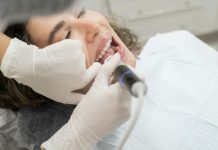
In a new study, researchers found that eating a healthy diet may reduce the risk of acquired hearing loss.
They examined three-year changes in hearing sensitivities and found that women whose eating patterns more closely adhered to commonly recommended healthful dietary patterns, such as the Dietary Approaches to Stop Hypertension (DASH) diet, the Alternate Mediterranean (AMED) diet, and the Alternate Healthy Index-2010 (AHEI-2010), had substantially lower risk of decline in hearing sensitivity.
The research was conducted by a team at Brigham and Women’s Hospital.
A common perception is that hearing loss is an inevitable part of the aging process.
However, there are potentially modifiable risk factors — that is, things that we can change in our diet and lifestyle to prevent hearing loss or delay its progression.
Previous studies have suggested that higher intake of specific nutrients and certain foods, such as the carotenoids beta-carotene and beta-cryptoxanthin (found in squash, carrots, oranges and other fruits and vegetables), folate (found in legumes, leafy greens, and other foods), long-chain omega-3 fatty acids (found in seafood and fish), were linked to lower risk of self-reported hearing loss.
In the study, the team established 19 geographically diverse testing sites across the U.S. and trained teams of licensed audiologists. Most of the participants were in their 50s and early 60s.
The audiologists measured changes in pure-tone hearing thresholds, the lowest volume that a pitch can be detected by the participant in a given ear, over the course of 3 years.
Using over 20 years of dietary intake information that was collected every four years beginning in 1991, the researchers examined how closely participants’ long-term diets resembled some well-established and currently recommended dietary patterns, such as the DASH diet, the Mediterranean diet, and Alternate Healthy Index-2010 (AHEI-2010).
They found after only three years, 19 percent had hearing loss in the low frequencies, 38 percent had hearing loss in the mid-frequencies, and almost half had hearing loss in the higher frequencies.
Despite this considerable worsening in their hearing sensitivities, hearing loss among many of these participants would not typically be detected or addressed.
Greater adherence to healthy dietary patterns was linked to many important health outcomes, including lower risk of heart disease, hypertension, diabetes, stroke, and death as well as healthy aging.
The odds of a decline in mid-frequency hearing sensitivities were almost 30% lower among those whose diets most closely resembled these healthful dietary patterns, compared with women whose diets least resembled the healthful dietary patterns.
In the higher frequencies, the odds were up to 25% lower.
The team hopes to continue to longitudinally follow the participants in this study with repeated hearing tests over time.
The lead author of the study is Sharon Curhan, MD, a physician and epidemiologist in the Brigham’s Channing Division of Network Medicine.
The study is published in the American Journal of Epidemiology.
Copyright © 2019 Knowridge Science Report. All rights reserved.



